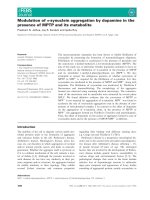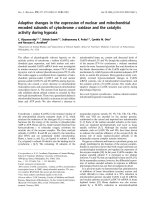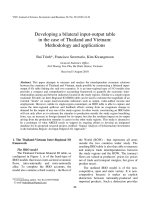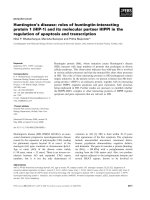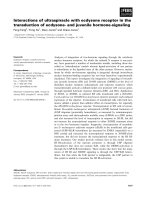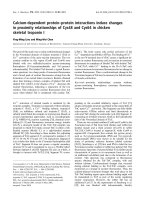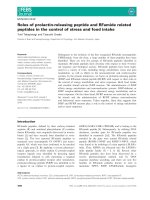Changes In The Relationship Of Pedagogy And Educational Science
Bạn đang xem bản rút gọn của tài liệu. Xem và tải ngay bản đầy đủ của tài liệu tại đây (500.31 KB, 11 trang )
CHANGES IN THE RELATIONSHIP OF PEDAGOGY
AND EDUCATIONAL SCIENCES
Le Ngoc Hung, Trinh Van Minh, Mai Quang Huy
(Faculty of Educational Management, VNU University of Education)
Abstract: Pedagogical science is defined as the science that studies education within the school. At the
same time, pedagogical science, often called pedagogy, is considered an indispensable part of educational
science that studies human education. Pedagogical science with different variations and names has developed
and become one of the educational sciences that study children and adult education within the school and society.
However, pedagogy, pedagogical science and educational sciences all face the problem of excess of reasoning and
lack of scientific theory; excess of practical experience and lack of scientific practice. According to the general
system theory approach, pedagogical science transforms and becomes an educational science in the system of
educational sciences that study the laws of formation, movement, change, and development of systems of the
“society – education – people” relationships. The article uses the method of literature review to clarify the issues
raised in the relationship of pedagogical science with educational sciences. Since then, the report suggests policy
implications and solutions to contribute to the development of pedagogical science in close relationship with
educational sciences.
Keywords: pedagogy, education study, educational science, educational sciences.
1. INTRODUCTION
Education is always a topic that attracts wide attention of the whole society, including leaders,
managers, researchers and educators. This creates a great opportunity for ideas and opinions, which
are very rich and diverse, and poses a challenge to clarifying scientific problems arising in education
in general and in research educational sciences in particular. The question of terminology alone can
cause controversy, for example Pedagogy or Pedagogical Science? Educational Science or Educational
Sciences? Another issue is what is the relationship between pedagogical science and educational
science? This article is not intended to raise and answer all of these questions. The purpose of the
article is to clarify the problem of lack of scientific theories of pedagogical science and educational
science. Applying the general systems theory approach, the article emphasizes that the position and role
of pedagogical science continues to change and becomes one of the educational sciences whose basic
research object is the relationship of “society - education - people”.
2. RESEARCH METHODS
The article uses a review research method including document review, scoping review and document
content analysis. The research sample is mainly monographs, textbooks for undergraduate and graduate
training in pedagogy, pedagogical science, educational science and other content related to the research
section 3: educational sciences with the renovation...
595
topic. At the same time, the survey samples are articles published in specialized journals of educational
science and a number of policy documents related to research and training in educational sciences.
3. OVERVIEW ON PEDAGOGY, PEDAGOGICAL SCIENCE, AND EDUCATIONAL SCIENCE(S)
Pedagogy: the origin of pedagogical science, educational science(s)
The term “pedagogical science” is not as common as the terms “pedagogy” and “educational
science” in Vietnam. This is evident in a series of books called “pedagogy” and “educational science”,
however it is very rare to find a book called “pedagogical science”1 in monographs and textbooks.
Therefore, it is necessary to understand the content of the concept of pedagogical science through the
content of concepts and definitions of pedagogy and educational sciences.
When giving a definition of pedagogy, one author said that the origin of this term comes from the
Greek paedagogus, meaning to lead male children, is based on the activity of the adults affects boys,
later extends to girls, and now affects adults. Since then, pedagogy is considered as a science that studies
the purposes, tasks, objects, contents and methods of education (both for children and adults)2.
Other definitions of pedagogy may not quote the origin of the foreign word for “pedagogical
science”, but all consider pedagogy as a science of human education, that is “pedagogical science”.
Some examples of definitions are as follows.
Pedagogy is a scientific discipline whose research object is the educational process with a broad
connotation, covering all educational and teaching impacts, oriented towards a definite purpose,
organized in a reasonable and scientific in order to form and develop learners’ personality3.
Pedagogy is a science that studies the process of educating people with the object of study is the
educational process, a special process in the activities of human society4.
Pedagogy mainly studies the process of human educating and mainly studies the formal education
process, which has a specialized nature of society (conscious and organized educational impact)5.
Pedagogy is an educational science that studies the nature, laws, trends and future development of the
educational process, with factors and means of human development as a personality in the whole of life6.
Following the same concept, but some authors specify that the object of pedagogy is “teaching - educating”7.
Without mentioning pedagogy, some authors define: ‘Educational sciences are a specialized
field of science that studies educational things, phenomena, problems, and processes in order to
understand the educational characteristics and relationships, and promoting the laws of educational
processes and activities”8.
1
2
3
4
5
6
Applied Pedagogical Science Research. Publisher of Pedagogical University. Hanoi. 2010.
Nguyen Tien Dat. 2004. Comparative Education. VNU Publishing House, Hanoi.
Nguyen Sinh Huy – Nguyen Van Le. 1999. General Pedagogy. Education Publishing House, Hanoi.
Pham Viet Vuong. 2014. Pedagogy. VNU Publishing House, Hanoi.
Tran Anh Tuan, Ngo Thi Thu Dung, Mai Quang Huy. 2009. General Pedagogy. VNU Publishing House, Hanoi.
Tran Thi Tuyet Oanh (Chief author), Pham Viet Vuong - Bui Minh Hien - Nguyen Ngoc Bao - Bui Van Quan - Pham Hong
Vinh – Tu Duc Van. 2016. Textbook of Pedagogy. University of Education Publishing House, Hanoi.
7 Thai Duy Tuyen. 2001. Modern Pedagogy. VNU Publishing House, Hanoi.
8 Tran Khanh Duc. 2011. Textbook of Educational Sciences Research Methodology. VNU Publishing House, Hanoi.
596
PROCEEDINGS OF 1 ST HANOI FORUM ON PEDAGOGICAL AND EDUCATIONAL SCIENCES
The content of educational sciences
The term “educational sciences” has been used, but is mainly used to refer to the disciplines of
“educational sciences” in the sense of pedagogy. Some examples can be given as follows.
System content. Some authors refer to the system by listing its components. “The system of
educational sciences includes: history of education and pedagogy. The later can be divided into different
levels such as pedagogy of preschool education, pedagogy of general education, pedagogy of vocational
education, pedagogy of higher education, pedagogy of adult education; pedagogy of special education;
theory of subject teaching”1.
General - major content: The scientific knowledge system of pedagogy is usually composed of
scientific specialties:
Pedagogy (general): including general issues, theory of teaching, theory of education, theory of
organization and management of schools.
Specialized pedagogy: According to the level of study, there are pedagogy of preschool education,
pedagogy of general education, pedagogy of vocational education, pedagogy of higher education, etc.
By field, there are majors: pedagogy of special education, pedagogy of adult education; history
of education; comparative education; subject (as math, physics...) education; educational management;
educational economics; sociology of education2.
Scientific interdisciplinary content. Do not use the word “educational sciences”, but some authors
argue that educational sciences develop according to the trend of differentiation and integration.
Therefore, educational sciences are constantly changing, developing many new majors such as
philosophy of education, history of education, comparative education, economics of education,
sociology of education, educational management3.
Some authors specify pedagogy as a pedagogical science and as a discipline of educational
sciences that specializes in the study of the educational process4. According to this concept, educational
sciences are a broad field of science, with pedagogy and interdisciplinary subjects between education
and philosophy, history, economics, sociology, national studies, the study of all aspects of education and
training in schools and in society in order to guide the development of education5.
4. RESULTS AND ISSUES
Result 1. The problem of pedagogy
A 2014 study on the weaknesses of more than 600 master’s theses on pedagogy and educational
management in Vietnam found the problem of over-describing the situation and under-researching
educational science theory6. That is: the majority (over 64%) of these theses focus on describing the
situation and proposing solutions without scientific theory. Only over 35% of these have “apply” theory to
research topics.
1 Nguyen Sinh Huy – Nguyen Van Le.op.cit.
2 Tran Anh Tuan et al., op.cit.
3 Tran Thi Tuyet Oanh et al, op.cit.
4 Mai Quang Huy. 2018. “Compare Bachelor of Education Science Programs” VNU Journal: Education Studies 34(1):47-57.
5Ibid.
6 Tran Thanh Ai. 2014. “ Weakness of scientific research in education in Vietnam: Causes and solutions.” Can Tho University
Journal of Science, Part C: Social Sciences, Humanities and Education. 33(2014): pp128-37.
section 3: educational sciences with the renovation...
597
A survey of pedagogical books found that pedagogy has educational theory and teaching theory,
has a dialectical and historical materialist philosophical methodology, and has methods of pedagogical
research. However, the problem of pedagogy is that there is very little mention of “theory of educational
sciences”. If a study contains a certain theory, it is also not clear and specific to understand that it is a
“scientific theory” applied in education. For example, a chapter on teaching theory of book on pedagogy
simply states “According to the theory of operations we see…” and then lists some of the contents.
That chapter of reasoning does not present anything better than to make it possible to understand the
theory of activity as a psychological scientific theory of human activity. This theory was developed by a
number of Russian psychologists and educators1 (former Soviet Union) and extensively researched and
deployed in education and training practice in a number of countries including Vietnam2.
Results 2. The problem of educational sciences
To contribute to the construction of “educational sciences” in Vietnam, the Journal of Educational
Research No. 2 in 1976 opened a page titled “Educational Science Terminology”. This page is responsible
for introducing the basic concepts of general pedagogy, pedagogy of subject education, general psychology,
age and pedagogical psychology, age physiology, school hygiene, history of education3. Educational
sciences have been defined as a system of scientific disciplines whose research object is the educational
process in certain historical - social conditions4, the educational phenomenon in society5. As early as 1980,
educational sciences were identified as having a structure of six disciplines: (i) theory and methodology
of educational science, (ii) educational theory, (iii) teaching theory, (iv) theory of organization and
management of education and schools, (v) comparative education, (vi) history of education6.
However, after nearly half a century, the problem of lack of scientific theory as a basis for building
educational sciences is still an urgent issue that needs to be raised. A review study (scoping) combined
with document content analysis for articles in the Journal of Education in 2019 shows that the current
status of research and theoretical implementation of educational sciences is as follows7. Firstly, the
number of articles in the category “Theory of education - teaching” accounted for over 46% of the total
of over 700 articles of the Education Journal in 2019. Second, only nearly a third (31%) in a total of 325
articles “Theory of education - teaching” using words from the theoretical category in the title of the
article and the abstract of the article. Third, there are only a very small number of 17 articles, accounting
for more than 5% of the total articles in the section “Theory of education - teaching”, introducing and
applying nine theories of educational sciences in teaching specific subjects and lessons or apply them
in general in education and training. Fourth, the articles cited are not many if not very few foreign
documents on the theory of educational sciences in the world.
Regarding foreign works on educational sciences translated into Vietnamese, there is a remarkable
paradox as follows. On the one hand, in recent years, many books by some foreign authors such as Jean
Piaget, Montessori and Howard Gardner etc. have been translated and published in Vietnamese and
Leonchep, A.N. 1989. Activity, Consciousness, Personality. Education Publishing House, Hanoi.
Pham Minh Hac. 1989. Behaviour and activity. Hanoi: Education Publishing House.
Ha The Ngu. 2001. Education: Some theoretical and practical issues. VNU-Publishing House, Hanoi. p.26.
Ha The Ngu, Ibid.
Trinh Van Minh (Chief author) - Dang Ba Lam. 2020. Education study research methodology. VNU-Publishing House,
Hanoi: p. 77.
6 Ha The Ngu, op.cit.
7 Le Ngoc Hung, 2020. “Theories of education studies for “society - education - human”. VNU Journal of Science: Education
Research, 36(3): 61-67.
1
2
3
4
5
598
PROCEEDINGS OF 1 ST HANOI FORUM ON PEDAGOGICAL AND EDUCATIONAL SCIENCES
have been referenced, researched and introduced. Practical books on a theoretical subject such as
mind maps have been translated and published many times in Vietnam. However, there are still many
books on theories of educational sciences that have not been translated into Vietnamese. On the other
hand, a theory that has been researched and applied the most in 2019 in the Journal of Education is
Kolb’s theory of experiential learning. But almost none of David Kolb’s books1 have been translated
and published in Vietnamese.
Preliminary findings from a 2019 scoping study of articles in a peer-reviewed educational journal
may help confirm the hypothesis. It is hypothesized that: studies on pedagogy, pedagogical science, and
educational sciences in Vietnam are still facing the problem of lack of scientific theory. Therefore, it is
necessary to strengthen research, introduce and creatively apply theories of educational sciences in the
world in fundamental and comprehensive renovation of education and training in Vietnam.
Result 3. Problems in the research contents of educational sciences
The basic research contents of educational sciences can be found in the Science and Technology
Classification of the Ministry of Science and Technology, in 2009. Accordingly, educational sciences
include three contents with corresponding codes are educational science in general, special education
(science) and other educational science issues (box 1). Pedagogy is one of the discipline of educational
sciences in general.
Box 1. Code and content structure of educational science
503. Educational science
50301. Educational science in general, including training, pedagogy, educational theory,
... Including main content such as: General educational theory; Pedagogy; Teacher training;
Education system; Pre-school education; General education; Higher education; Post-graduate
education; Ongoing training; Lifelong learning; Professional training; Vocational training; Other
general education and training issues.
50302. Special education (by subjects, for people with disabilities,) Includes main contents
such as: Education in special cases; Education in specialized schools; Education for people with
disabilities; underdeveloped; Other special education.
50399. Other educational issues.
Source: Ministry of Science and Technology. Classification of fields of scientific and technological research. (Decision No. 12/2008/QD-BKHCN dated September 4, 2008 of the Ministry of Science and Technology and Decision
No. 37/QD-BKHCN dated January 14, 2009 amending Decision 12/2008/QD - BKHCN). Hanoi, June 2011.
Result 4. Problems in the training content of pedagogy and educational sciences
The Education and Training Directory of the Vietnamese national education system (2017)
defined: “Educational sciences are a group of disciplines and professions focusing on teaching and
learning principles and theories, including curriculum development, program inspection and evaluation,
educational research, other educational sciences”, and stipulated training programs of the group of
1 Even one of the most cited books is Kolb’s book, David. 1984. Experiential Learning: experience as the source of learning
and development. Englewood Cliffs, Prentice Hall.
section 3: educational sciences with the renovation...
599
educational sciences at the levels of higher education (table 1). Pedagogy appears in undergraduate and
graduate training programs, including training at master’s and doctoral levels. Theories of educational
science and Methods of educational science (research) are not found in training programs at master’s
and doctoral levels. At the undergraduate level, there are bachelor’s degree programs in pedagogy and
educational management.
Table 1. Programs of educational science training
Level
Training
program
Bachelor
Master
Pedagogy
Pedagogy
Educational
Educational management
management
Teaching theories and methods
Subject teaching theories and
methods
Measurement and evaluation in
education
Designing educational and
teaching means
Comparative and international
education
Special Education
Doctor
Pedagogy
Educational management
Teaching theories and methods
Subject teaching theories and methods
Measurement and evaluation in
education
Designing educational and teaching
means
Comparative and international
education
Special Education
Theories and history of education
Source: Education and training directory of the Vietnamese national education system at undergraduate, master
and doctoral levels. According to Document No. 15/VBHN - BGDĐT dated May 8, 2014; and Circular 25/2017/
TT-BGDDT dated October 10, 2017 of the Minister of Education and Training.
Results of a quick review of the catalog of knowledge of the Bachelor Program of Pedagogy of
the National Academy of Education Management and the Bachelor Program of Educational Science
of the VNU University of Education discovered two important things. The program of Bachelor of
Educational Science has been trained at the VNU University of Education since 2019 for the first
time in Vietnam. The program of Pedagogy may lack “educational sciences” when there is no module
with a name directly associated with this word, even though there is a module “General Pedagogy”.
Meanwhile, the Program of Educational Science has modules such as “Introduction to Educational
Science”, “Educational Scientific Research Methodology”, “Theory of Human Development and
Learning”, “Theories of Modern Educational Science”.
The results of an overview of the table of contents of 2 textbooks on pedagogy are summarized
in Table 2. Both of these textbooks have been reprinted many times and are used in universities of
teacher education. In terms of content, both books have 4 parts with nearly equal number of chapters
(18-19 chapters). Both books can be heavy on educational theory, teaching theory and practice of school
education because there are three corresponding sections on this content. However, both books are
probably still lacking theory of educational sciences as not a part, a chapter and a section contains the
word “theory of educational sciences”. A thorough review of the content of the single chapter entitled
“Pedagogy as a Science” found no modern educational science theory mentioned in any section of this
chapter. Of these two chapters, only once B.P. Skinner (1968) is credited with being the first to use
600
PROCEEDINGS OF 1 ST HANOI FORUM ON PEDAGOGICAL AND EDUCATIONAL SCIENCES
the term “teaching technology”1. Both of these books define pedagogy as science and both have the
educational process as the object of study, perhaps similar to other definitions of pedagogy.
Table 2. Summary of results of a review of two books on pedagogy
Name of the
book
Pedagogy
Book type
Textbook for universities and colleges
of teacher education.
(Textbook) For universities of teacher
education.
Print time
Fourth
Eighth
Publishing
House
Hanoi National University of Education Hanoi National University of Education
Year
Text book for Pedagogy
2014
2016
411
501
Number
of parts /
chapters
4 parts / 18 chapters
4 parts / 19 chapters
Chapter
2. Pedagogy is a science
1. Pedagogy is a science
12
14
Science has the task of studying the
nature and laws of education, forming
theories of education and teaching,
in order to deploy and apply research
results into real life (p. 24).
Science that studies the nature, laws, trends
and future development of the educational
process, with factors and means of human
development as a personality throughout the
whole life (p. 19).
Number of
pages
Number of
pages
Definition of
pedagogy
Research
object
the educational process of character whole educational process, realistic with
formation for the young generation and purpose, organized in a given society (p. 19)
the process of training human resources
for the society (p. 23)
Discussion: From pedagogical science, pedagogy to educational sciences
The problem of lack of scientific theory as discovered above can be related to the history of
scientific development in general and educational sciences in particular. Similar to many other
sciences, the emergence of a term such as Pedagogy perhaps only marks the birth of an activity, a field
of study in education. Whether that field becomes a science similar to natural science or not requires
certain conditions.
Pedagogy can be distinguished with two meanings. Firstly, pedagogy is a pedagogical science in
the sense that it is a science that studies the educational process mainly of children as in the original
Greek and mainly education within schools. Secondly, pedagogy as pedagogical science has emerged
and evolved in the historical development of society. In both these senses, pedagogy must go through
a long history of research in partnership with and inherit the fruits of other sciences including physics,
biology, psychology, social science and many other sciences. Perhaps that pedagogy has become an
“educational science” studying the laws and regularities of the formation, movement and change of the
1
Tran Thi Tuyet Oanh et al,. op.cit.
section 3: educational sciences with the renovation...
601
educational system and process since the second half of the nineteenth century1. This reflects the law of
the development of disciplines in the field of social sciences and humanities. For example, psychology
appeared very early, but it was probably not until Wundt founded the psychology laboratory at the
University of Leipzig in 1879 that psychology became a science and can be called at length “the science
of mind” and briefly called “psychological science”2. Another example is sociology that has appeared
in the form of ideas, a priori studies, and long experience in social history. But it was not until 1838
that the term “sociologie” appeared in France, and the science of real sociology began to develop in the
United States in 1892. The appearance of a word, a term including the use of a certain spectrum of words
such as “educational science”, “pedagogical science”, and “educational science” is not enough to develop
educational sciences. Other conditions required include scientific institutions such as a scientific research
organizations and corresponding specialized training in universities, specialized scientific journals, and
respective professional associations.
Similar to other sciences, educational sciences are a system of educational science theories, a system
of educational scientific research methods and methodologies. Perhaps due to the lack of attention to
the qualitative difference between pedagogy and educational sciences, many monographs, textbooks,
and textbooks on pedagogy rarely give due attention to the presentation of the material and educational
theories. The lack of a clear theoretical approach to educational sciences can lead pedagogy to become a
field of educational practice, pedagogical practice “excess theory, lack of scientific theory”3.
5. PEDAGOGICAL SCIENCE IN EDUCATIONAL SCIENCES
The general systems theory approach of the educational sciences
It is easy to say that pedagogical science is a discipline within the educational sciences. However,
what does this mean if it does not answer the question what are educational sciences?
The educational sciences are not the sum total of the individual scientific disciplines. Many authors
simply list the sciences related to education to collectively call them “educational sciences”. It should
be seen that educational sciences are formed and developed according to the general systems theory4
approach. The general system theory approach emphasizes five characteristics of systems that always
interact with their environment. The five characteristics and also five principles of the system are
openness, goal-direction, superiority, multidimensionality, and counter intuitiveness. Thanks to that,
the system always changes, differentiates, adapts and develops continuously in a complex relationship
with the change of the surrounding environment. This theoretical approach helps to answer theoretical
and practical questions about the formation, transformation and development of educational sciences.
For example, when the advancement and extensive application of modern media, including digital
communication and digital technology, appear in the environment, the educational sciences must also
pay attention to the study of changes in the environment of the digital age.
Theoretically, the general systems theory approach states that education is an open social system
that always interacts with surrounding systems and environments. Vietnamese society is innovating in the
1 Le Ngoc Hung, 2015b. Sociology of Education. VNU-Publishing House, Hanoi.
2 The behaviorist John Watson set forth his strict standard that only when psychology adopts a behavioral approach does
psychology become an objective science.
3 Le Ngoc Hung, 2020. “Theories of education studies for “society - education - human”. VNU Journal of Science: Education
Research, 36(3): 61-67.
4 Gharajedaghi, Jamshid. 2005. Systems Thinking. Managing chaos and complexity. A platform for designing business architechture.
Social Sciences Publishing House, Hanoi.
602
PROCEEDINGS OF 1 ST HANOI FORUM ON PEDAGOGICAL AND EDUCATIONAL SCIENCES
direction of industrialization and modernization in the environment of globalization, world integration
and the Fourth Industrial Revolution with prominent elements of digital technology. Education is a
system made up of sub-systems in which the educational sciences must necessarily shift and innovate
to adapt to the changes of the whole society. In practice, scientific theory has the position and role of
“guideline, torch to light the way” for human behavior and activities. In science, theory is the basis,
frame of reference for empirical research.
The general systems theory approach in the educational sciences helps to answer the question of
“why”, without which the best scientists can only describe the reality of what kind of vision they see.
It is difficult to identify causes and influencing factors. Lacking a general systems theory approach,
educators including educational administrators, teachers and learners find it difficult to grasp the
nature of things and phenomena in open systems with surroundings. Without this approach, educators,
including teachers and learners, can only answer “what” and “how” questions and can act stereotyped,
mechanically according to what is indicated, taught and learned. With a general systems theory approach,
educators not only have the quality and capacity to understand what the real problem is, but also the
quality and ability to explain why this is so able to innovate, create and develop sustainably in an everchanging environment. In short, according to the general systems theory approach, it is necessary to
consider the educational sciences as a system of educational sciences characterized by its “system of
scientific research objects”.
Research objects of educational sciences
Based on the modern general system theory approach1, it is possible to identify the research object
of the educational sciences as the relationship system “society - education - people”. This is a “dual”
relationship system with one side being the relationship between education and society and on the other
hand the relationship between education and people2.
The basic research question of the educational sciences is: how does the relational system of
“society-education-people” form, change and develop? From this basic question, many specific research
questions can be raised, for example: what is the position and role of education in a digitized society?
What is the position and role of education for people in the digital age? Regarding the topic of this
study, it is possible to ask questions: pedagogy, pedagogical science and educational sciences are changing
their position and role3 for both society and people in the transition process to market economy and world
integration of the digital age?
Education not only imparts scientific and technological knowledge but also conducts research to
produce scientific and technological knowledge. The new pedagogical science in educational sciences
has the task of contributing to research and clarify the change of the “society - education - human”
relationship system in the digital era. Pedagogical science, pedagogy, and educational science, although it
is not enough to expand the scope of school education research to family education, social education, and
interdisciplinary and transdisciplinary. Because the problem is not simply expanding or interdisciplinary
in a mechanical, mechanical way of addition, or extension. The problem is evolution, development
1 Le Ngoc Hung. 2015a. Social system, structure & differentiation. VNU-Publishing House, Hanoi.
2 Le Ngoc Hung. 2015b. op.cit.
3 This hypothesis is posited in the way that Lyotard hypothesized that knowledge changes status as soon as societies enter
the so-called post-industrial age and cultures enter the so-called postmodern age. Lyotard, Jean-Franỗois. 1979/2007.
Postmodern situation. Hanoi: Knowledge Publishing House. P.59.
section 3: educational sciences with the renovation...
603
according to the system principle, the general system theory. Pedagogical science also changes in
the direction of applying the general system theory approach to study the object system which is the
relationship system “society - education - people”. According to the general systems theory approach,
the educational sciences is a system of sciences that studies the laws of the formation, transformation
and systematic development of the relationships “society - education - people”. Thus, the research object
of the educational sciences (system) is the system of “society - education - people” relationships.
In fact, some authors, although not invoking the general systems theory approach, still give the view
in the direction of considering the educational sciences as a system with research objects of different
levels of the system from micro to macro. According to this concept, the educational sciences study the
macro - phenomenon of education such as demographic, economic, social, institutional or cultural issues
that have a direct impact on education, but are outside of each individual1. Educational sciences research
and teach theoretical issues and educational methods in schools and outside schools, which are methods
of knowledge transmission and capacity development for each individual2.
6. CONCLUSION
The pedagogical science (pedagogy) is innovating from an educational science with many practices
in school education to a science with a central position and role in modern educational sciences to meet
the requirements of world integration and the digital age. In the trend of development according to the
general system principle, which is reflected in the trend of specializing, inter-, trans-, multi-disciplinary,
the current sciences have formed a system of “Educational sciences” which is not the addition of
disciplines of educational science. It is a system of educational sciences that includes different sciences
and even competes in the unity of research with the same research object system, which is the system
of relationships of “social - educational - people”. The educational sciences attempt to address the
fundamental research question: how do people and societies decide to do education? How does education
affect human development and social development? The answer from the system of educational sciences
here is that people and society are increasingly actively and actively doing education in a scientific way
to ensure the development of human beings with a life in harmony with the surrounding environment.
Education based on educational sciences will play an increasingly important role in human and social
development. As an inevitable part of the system of educational sciences, pedagogical science also
changes, develops according to the general systems theory approach and plays a central and core role in
the study of the system of relationships of “society - education - people”.
Within the framework of an article to present at a scientific conference, the article limits the scope
of an overview of some documents and focuses on applying the general systems theory approach to
clarify a basis content of the educational science is its object of study. The article is limited to stating
the numerical factor as a factor of environmental change that education must take into account and the
corresponding system of educational sciences must pay attention to research. Another study may need to
focus on clarifying the system of theories and methods of educational sciences that the new pedagogical
science needs to apply and deploy to ensure that it meets specific requirements of the digital age.
1 Trinh Van Minh, Dang Ba Lam, op.cit.
2Ibid.
604
PROCEEDINGS OF 1 ST HANOI FORUM ON PEDAGOGICAL AND EDUCATIONAL SCIENCES
REFERENCES
1.
Ministry of Science and Technology. Field of Science and Technology Classification. Decision
No. 12/2008/QD-BKHCN dated 04 September 2008 of the Ministry of Science and Technology
and Decision No. 37/QD-BKHCN dated 14 January 2009 on amendment of Decision 12/2008/
QD - BKHCN. Hanoi, June 2011.
2.
Ministry of Education and Training. Education and training classification of the Vietnamese
national education system at undergraduate, master, and doctoral degree levels. Document
No. 15/VBHN - BGDDT dated 08 May 2014; and Circular No. 25/2017/TT-BGDĐT dated 10
October 2017.
3.
Gharajedaghi, Jamshid. 2005. Systems Thinking. Managing chaos and complexity. A platform
for designing business architechture. Social Sciences Publishing House, Hanoi.
4.
Ha The Ngu. 2001. Education: Some theoretical and practical issues. VNU-Publishing House, Hanoi.
5.
Le Ngoc Hung. 2015a. Social system, structure & differentiation. VNU - Publishing House, Hanoi.
6.
—. 2015b. Sociology of Education. VNU - Publishing House, Hanoi.
7.
—. 2020. “Theories of education studies for “society - education - human”.” VNU Journal of
Science: Education Research, 36(3): 61-67.
8.
Leonchep, A.N. 1989. Activity, Consciousness, Personality. Education Publishing House, Hanoi.
9.
Lyotard, Jean-Franỗois. 1979/2007. La condition postmoderne. Tri Thuc Publishing House, Hanoi.
10.
Mai Quang Huy. 2018. “Compare Bachelor of Education Science Program”. VNU Journal:
Education Studies 34(1):47-57.
11.
Nguyen Sinh Huy – Nguyen Van Le. 1999. General Pedagogy. Education Publishing House, Hanoi.
12.
Nguyen Tien Dat. 2004. Comparative Education. VNU - Publishing House, Hanoi.
13.
Pham Minh Hac. 1989. Behaviour and Activity. Education Publishing House, Hanoi.
14.
—. 2005. Psychology Anthology. National Political Publishing House, Hanoi.
15.
Pham Viet Vuong. 2014. Pedagogy. VNU - Publishing House, Hanoi.
16.
Thai Duy Tuyen. 2001. Modern Education. VNU - Publishing House, Hanoi.
17.
Tran Anh Tuan, Ngo Thi Thu Dung, Mai Quang Huy. 2009. General Pedagogy. VNU - Publishing
House, Hanoi.
18.
Tran Khanh Duc. 2011. Textbook of Education Sciences Research Methodology. VNU Publishing House, Hanoi.
19.
Tran Thanh Ai. 2014. “Weakness of scientific research in education in Vietnam: Causes and
solutions.” Can Tho University Journal of Science, Part C: Social Sciences, Humanities and
Education. 33 (2014):128-37.
20.
Tran Thi Tuyet Oanh (Chief author), Pham Viet Vuong - Bui Minh Hien - Nguyen Ngoc Bao - Bui
Van Quan - Pham Hong Vinh - Tu Duc Van. 2016. Textbook of Pedagogy. VNU - Publishing
House, Hanoi.
21.
Trinh Van Minh (Chief author) - Dang Ba Lam. 2020. Education Sciences Research Methodology.
VNU-Publishing House, Hanoi.
